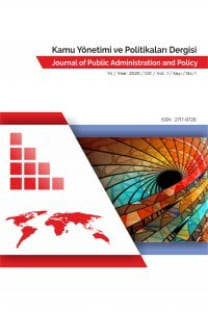Ukrayna'da işgücü piyasasının işleyiş sistemi içinde standart dışı istihdam biçimlerinin geliştirilmesi
Ukrayna işgücü piyasasının işleyiş sisteminde, standart dışı yeni istihdam modelleri oluşturulmaktadır, bu da işçilerin emek potansiyellerinin gerçekleştirilme biçimini özgürce seçmelerine izin vermektedir. Standart dışı istihdam özelliklerini ve özelliklerini değerlendirmek için, çoğunlukla "gri bölge" işgücü piyasasında olduğu için dolaylı yöntemlerin kullanılması gerekiyordu. Ukrayna işgücü piyasasında standart dışı istihdam biçimlerinin gelişimi göz önünde bulundurulmuş, çalışanların ve işverenlerin istihdam ilişkileri açısından olumlu ve olumsuz yönleri tespit edilmiş, daha fazla yasal düzenleme ihtiyacı ve bu alanda yasal normlar getirilmesi uluslararası yasal çerçeveye uyum kaydedildi. Standart dışı istihdamın getirilmesinin, iç işgücü piyasasının esnekliğinin artırılmasına ve çalışanların işlerinde mesleki yeterliklerini en etkin şekilde uygulama yeteneklerinin artırılmasına katkıda bulunacağı kanıtlanmıştır. Ukrayna işgücü piyasasının işleyiş sisteminde standart dışı istihdamın düzenlenmesine ilişkin devlet politikasının tedbirleri önerilmektedir.
Anahtar Kelimeler:
standart dışı istihdam, istihdam biçimleri, işgücü piyasası esnekliği, hükümet düzenlemeleri, Ukraine
Development of non-standard forms of employment within functioning system of labour market in Ukraine
In the system of functioning of the Ukrainian labour market, new non-standard employment models are being formed, these allowing workers to freely choose the form of realization of their labour potentials. To evaluate non-standard employment traits and characteristics indirect methods had to be used as this is mostly in the “grey zone” labour market. The development of non-standard forms of employment in the Ukrainian labour market has been considered, its positive and negative aspects in terms of the employment relationship of employees and employers have been identified, the need for further legislative regulation and bringing legal norms in this area to the compliance with international legal framework has been noted. It has been substantiated that the introduction of non-standard employment will contribute to the promote flexibility of the domestic labour market and to increase the ability of workers to most effectively implement their professional competence in the work. Measures of state policy on the regulation of non-standard employment in the system of functioning of the Ukrainian labour market are proposed.
Keywords:
non-standard employment, forms of employment, labour market flexibility, government regulation, Ukraine,
___
- Atamas, S. (2017). Development of IT-branch in Ukraine: Look from aside. Visited: 28 June 2020, https://kreston-gcg.com/ua/development-of-the-it-industry-in-ukraine-a-side-view).
- Baikov, A. (2019). Flexible working time as a normative mean of working schedules individualization in EU. Visited: 28 June 2020, http://www.baltic-course.com/rus/opinion/?doc=42228.
- Bokov, O. (2018). Institutional mechanism of EU policy in the sphere of the employment of population. Kozhemiakina, S. and Kalinina, S. (Ed.). Labour market and employment in Ukraine: actualities and prospects (334-349). Kyiv: Ukrainian State Employment Service Training Institute.
- Bokov, O., Dzhincharadze, N. and Hulevich, O. (2018). Actual trends of labour market development in Ukraine. Кyiv: Ukrainian State Employment Service Training Institute.
- Dombrovskaya, I. (2006). Institutional mechanism of adoption of federal state unitary industrial enterprises for market conditions. Izhevsk: Udmurt State University.
- Experience of Croatia: Labour Code vs. agency employment! Indipendent trade union. (2007), Independent journal of trade unions of Russia, 2(2), 26-27.
- Huk, L. (2015). State regulation of non-standard employment. Kyiv: State Organization “Institute for Economics and Forecasting”, Ukrainian National Academy of Sciences.
- International Labor Organization, S. (2019). Visited: 28 June 2020, http://www.ilo.org.
- Istomin, S. (2009). Nature of institutional mechanism. Herald of Chelyabinsk State University. Economy Ser., 1(139), 46–52.
- Lyubokhynets, L. (2011). Elastic forms of employment and flexibilization of labour market amid deepening of globalization processes in world economy. Herald of Khmelnytskyi National University, No. 6, Vol. 4, 243–248.
- Miedema E. P. and Hesselink, K. (2002), Employed or excluded, TNO Work & Employment. Hoofddorp.
- Neuburg, C., Castongey, D. and Rolen, K. (2005). Systems of social protection of population: lessons of European experience. Washington D.C.: The World Bank.
- Perehudova, T. (2015). Institutional mechanism of regulating non-standard employment in Ukraine, Ukraine: labour aspects, 4, 24-33.
- Perehudova, T. (2015). Social threats of non-standard employment and methods of their minimization, Problems of contemporary economy 2015 Conference. Zaporizhzhia, Ukraine, 13-14 February. Zaporizhzhia: SIEU, Part 1, 69-73.
- Rantala, A. (2003). Labour market flexibility and policy coordination in a monetary union. Bank of Finland Discussion Paper, 11.
- Ukraine. From crisis to economic advance. Plan of modernization of Ukraine. (2019). Visited: 28 June 2020, http://modernization.fru.org.ua/images/documents/Ukraine_part.pdf.
- Verkhovna Rada of Ukraine. (2020). Visited: 28 June 2020, https://zakon.rada.gov.ua/laws/show/5067-17?lang=en#Text.
- Zhadan, O. (2014). Causes and effects of the spread of non-standard employment in national labour market. Theory and practice of state administration. 3 (46). Visited: 28 June 2020, http://www.kbuapa.kharkov.ua/e-book/tpdu/2014-3/doc/2/02.pdf.
- ISSN: 2717-9729
- Yayın Aralığı: Yılda 3 Sayı
- Başlangıç: 2020
- Yayıncı: Cenay Babaoğlu
